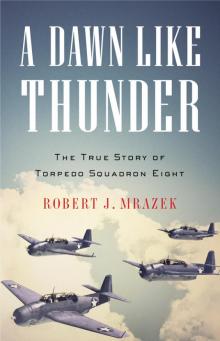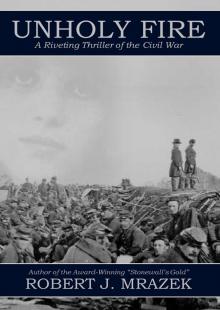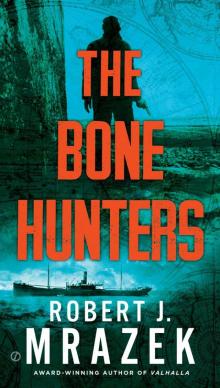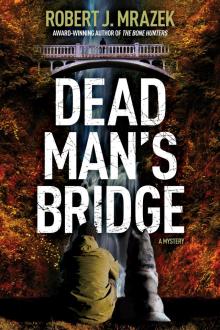- Home
- Robert J. Mrazek
The Deadly Embrace - v4 Page 2
The Deadly Embrace - v4 Read online
Page 2
She found a clean towel in the closet, and headed down the hall to the cold, drafty bathroom that she shared with the three other officers on her floor. Thankfully it wasn’t occupied. When she turned on the hot-water tap, the pipes began clanking and groaning in their usual manner. Glancing into the mirror, she saw that her eyes were rimmed in red.
A few minutes later, the tap had produced five inches of lukewarm water in the base of the chipped enamel tub. She lowered herself into the bath, carefully washing the dried blood and plaster dust from her hair and body as best she could.
The telephone began to ring in the hallway one flight down. She heard footsteps coming up the stairs, and then the grumbling voice of Pete Meadows, a former P-47 ace who had been grounded for recklessness and was waiting for a staff assignment.
“Everyone still alive up here?” he called out.
“As far as I know,” another voice replied.
Liza had left the door to her bedroom open. From the sound of his footsteps, Meadows headed first in that direction. Then, she heard him arrive at the bathroom door.
“You in there, Lieutenant Marantz?”
“Yes,” she said.
“A major named Samuel Taggart wants you at his office in SHAEF at 0900. He is sending a staff car for you.”
“Thank you,” she said through the closed door.
Liza climbed out of the tub, toweled herself off, and went back to her room to assemble a presentable uniform. The rain had finally stopped when she came out on the street again, through the wrecked front entrance of the hotel. Streamers of black clouds scudded low across the still-smoking city.
The bodies of Slattery and the young red-headed woman had long since been removed from the sidewalk, and an elderly charwoman was making an attempt to wash away their blood with a bucket of water and a long-handled brush.
A black Humber was waiting at the sidewalk with the engine running. She gave her name to the young driver, and he came around to open the rear door for her. Sinking back into plush leather upholstery, she wondered who Major Taggart was, and why he wanted to see her.
At Aldford Street, a long convoy of military trucks was passing by in an unbroken stream. On the next corner, a team of laborers was clearing a gigantic pile of rubble from the roadway where an office building had collapsed.
“When do you think the balloon will go up, Lieutenant?” asked the young driver as they sat waiting in the car. “I hear we’re going to invade at Calais.”
He pronounced it “Ka-LACE.” No more than eighteen, he spoke with the flat nasal cadence of the Great Plains.
“If you know that, you must be driving General Eisenhower,” she said.
“No sir, he’s got himself an Irish girl driving him,” he said, turning around with an innocent smile. “She’s prettier than Dorothy Lamour.”
Everyone knew that the invasion of Hitler’s Fortress Europe was coming. The island was practically sinking under the weight of millions of combat soldiers, most of them Americans. Liza had read in Stars and Stripes that a new infantry division was arriving in a fast convoy from the United States every week. Outside the car window, the sidewalks thronged with uniforms of every color and design—Czechs, Free French, Americans, Poles, Dutch, and English.
Ten minutes later, she got out of the Humber in front of a massive brick building on Saint James Square. An imposing sign above the main entrance read,
SUPREME HEADQUARTERS — ALLIED EXPEDITIONARY FORCE
A squad of armed British sentries stood guard along the sidewalk in front of the building. Double walls of ten-foot-high sandbags flanked the doors. Men in a variety of colorful Allied uniforms were waiting in line to gain entry past a sergeant who was checking their identification from inside a small kiosk next to the wall of sandbags.
“I’m here to see Major Taggart,” she said, presenting her identity card when she arrived at the head of the line.
The sergeant matched her card against a list of names on his clipboard.
“Military Security Command,” he said. “Fourth floor.”
Once inside, she saw that the place was a madhouse of nervous energy. Through the open doorways in the dark-paneled corridors, she saw tired-looking secretaries clattering away on typewriters while clouds of cigarette smoke billowed above their heads. Officers and enlisted men surged up and down the halls as if victory over the Germans hinged on their every step.
Reaching the fourth floor, she encountered another sign at the top of the staircase: “Military Security Command—No Unauthorized Personnel. Two uniformed American soldiers guarded the entrance to the hallway. Liza presented her identity card again to the first one. He took it over to the logbook lying on a small table and found her name on another list.
“Major Taggart is in the last office on the right,” he said in a slow Texas drawl.
The big walnut door at the end of the hallway stood open. When she stepped inside, Liza thought for a moment that she had to be in the wrong place. The room was barely larger than a freight elevator. Aside from a small desk and two side chairs, an old leather couch occupied most of the remaining space.
Her first thought was that the man lying on the couch looked like an incredibly seedy version of Humphrey Bogart in The Maltese Falcon. Unshaven and smoking a cigarette, he was wearing a ratty bathrobe, red flannel pajamas, and carpet slippers. Looking up from the report on his chest, the man said, “I assume you’re Lieutenant Marantz.”
“Yes … sir,” she said, as he pushed himself up from the couch and tossed the report over to the desk.
He looked like a football player, all solid mass, slab chest and powerful legs—an aging fullback with a full head of slate-gray hair and morose brown eyes. His nose looked like it had been broken more than once.
“We’re a little pressed for space around here,” he said, pointing at the chair in front of the desk. “Want some coffee?”
“No sir,” said Liza, sitting down in one of the side chairs while he poured himself a cup and carried it over. She wondered whether he was living in his office.
A thick stack of reports and documents rose from the blotter on his desk. Lying next to it was a pack of Chesterfield cigarettes, a box of kitchen matches, and a bar of Hershey’s chocolate.
“If you want to know the truth, coffee and cigarettes are fueling the war effort right now, not tanks and gasoline,” he said, sifting through the papers.
He found another folder and began to scan the first page. When the right sleeve of his pajama shirt slid back to the elbow, she saw a white gauze bandage on his wrist and discarded the notion that he was living there.
“I was wearing these clothes when my billet took a direct hit last night,” he said, as if divining her thoughts. “But this is nothing compared with what the Brits went through in ’41. The little man in Berlin had a temper tantrum after we firebombed Hamburg. This is his personal retaliation.”
Her eyes dropped to the folder again. Even upside down, she recognized the capitalized letters of her last name at the top of each page inside the standard personnel jacket.
“I’m thinking of offering you a job,” he said, glancing up at her again.
She waited for him to continue.
“Let’s see…. Twenty-five years old … Enlisted in the Women’s Army Corps a week after Pearl Harbor … Eighteen months of training at a military pathology unit in Philadelphia before assignment to Valley Forge Army Hospital … Applied three times for overseas duty,” he muttered before flipping back to the first page. “It also says here that you studied forensic medicine at New York Medical College.”
“Yes sir, although I left school to enlist when the war began.”
“According to this professor—Dr. Brubaker—you have superior, even remarkable powers of scientific deduction.”
“He … exaggerates.”
“Yeah, well, he claims that while your anatomy class was dissecting an anonymous cadaver, you concluded after a twenty-minute examination that the woman had been p
oisoned.”
“That would have been discovered by any competent pathologist if there had been an autopsy,” she said.
“It also says that the case was reopened, the corpse was identified, and a man was actually charged with the crime.”
He took a last deep drag on his cigarette and stubbed it out.
“And convicted,” she added as he partially unwrapped the chocolate bar and extended the open half toward her.
“No thank you,” she said.
“What can you deduce about me?” he asked with a caustic grin.
The question took her aback. Was he playing some kind of game with her?
“Come on—go ahead,” he said gruffly.
His hands seemed to be in constant, nervous motion. As he lit the tip of another cigarette, her eyes roved to the broken knuckles holding his nickel-plated lighter, then up to the lumpy bridge of his nose.
“I grew up in a place called Sheepshead Bay…. In those days it was a good thing if you learned how to fight. And you can see how good I was,” he said, pointing at his damaged nose. “Aside from that.”
She stared back into the well-lined poker face.
“You’re … you were a police officer,” she said.
“Well, that’s a stunning piece of deduction…. Yeah, I was a New York City homicide cop—fourteen years. Then I got fired and went private. What else?” he demanded, seemingly all male life force and toughness.
“Why were you fired?” she blurted out.
“What do you think?” he came right back.
She thought for a moment and said, “You were too docile and mild-mannered.”
He smiled again.
“She has a sense of humor. Deduce again.”
“Insubordination,” she said.
“Close enough. What else?”
“You went to college,” she said.
“Yeah … City College.”
“The first in your family,” she went on.
He nodded.
“Why do you try to mask it?”
“What?”
“Your intelligence,” she said.
“What else?” he demanded again.
She was still trying to process the jumble of confusing images he presented to her. The magnificent ruin of a face, the restless mind, the heavy pouches under his seemingly disillusioned eyes, the weariness, the strain. All of it could simply be the pressure of his job, or what had just happened to him in the bombing raid.
“This is silly,” she said.
“No, it isn’t. Say what you think,” he said.
“I think,” she began, “I think you’ve recently suffered a serious emotional blow, the loss of someone very dear to you.”
For a moment, his brooding eyes dropped their guard. She saw a spark of anger followed by a momentary look of desolation. He shook his head disdainfully and said, “After three years of war, who hasn’t? I could probably say the same thing about you.”
He saw the sudden distress in her face. His eyes softened as she stared down at her lap.
“Have you ever heard of the code name Overlord, Lieutenant Marantz?”
“I doubt if I was supposed to, but I’ve been staying at a hotel full of army staff officers since my arrival in London. It’s the code name for the campaign to open the second front in France.”
He nodded and said, “I work for General Ernest Manigault, the head of the Military Security Command here at SHAEF. My job is helping to provide security protection for Overlord. I’ve been asking for a forensic pathologist for months now to complete our investigative unit. You are the closest thing the paper pushers could come up with. You’ll start work here tomorrow morning.”
“Here?” she said, glancing around the tiny office.
He laughed.
“In one of the offices downstairs.”
“What will I actually be doing?” she asked.
“Right now, there are no active investigations pending, but I don’t expect that to remain the case. In the meantime, you can start with a sensitive task that we all have to share around here—reading each other’s mail.”
“You mean censoring people’s personal letters?”
He finished the chocolate bar.
“In a nutshell, the Germans know we’re coming,” he said. “The question is where and when. That invasion plan is the most important secret we have over here, and we’re responsible for its protection. So far, General Manigault’s command has provided security clearances to four hundred and sixty-two officers and support staff who are involved in planning the invasion. Presumably, none of them are security risks. All of them were thoroughly checked out. But every one of those people knows the proposed target date, and they also know where we’re going in. Do you understand?”
“Yes, of course,” said Liza.
“If just one of them were to betray that information, perhaps inadvertently or unknowingly to German agents, Hitler would put enough panzer divisions behind those landing beaches to drive us right into the sea. The whole invasion force could be wiped out on the first day. So we read everyone’s mail.”
“I understand,” she said.
“Maybe you can use your deductive powers to help plug any leaks,” he added almost kindly.
“Yes, sir.”
“Just a couple more things,” he said.
For the first time, he sounded a little unsure of himself.
“I don’t know exactly how to say this…. Look, you’re young and you’re pretty. Around here that usually means you’re being used as a mattress by somebody … and those somebodies usually have ‘General’ or ‘Admiral’ in front of their first names.”
“You don’t have to worry about that,” she said emphatically.
“I won’t, but you should be prepared for it, and the fact that you may receive propositions that...”
“I understand.”
“One more thing,” he said, softly, as she stood up to leave.
“Yes sir?”
“Sit down,” he said, and she did.
“You’re Jewish.”
She waited several moments for him to continue.
“So?” she said, finally.
“How important is your religion to you?” he demanded.
She imagined her gray-haired father looking over her shoulder, thin and rumpled, with his metal-rimmed spectacles perched on the tip of his nose, a gentle smile on his face.
“My father is a rabbi,” she said.
“Yeah … I saw that in the folder. Conservative, right?”
She nodded.
“I caused him great pain when at seventeen I told him I was no longer a practicing Jew and wouldn’t be going to temple.”
“And what did he say?” asked Taggart.
“He was wise enough to say that he respected my decision as an honest questioning of my faith…. And why is any of this relevant to my job?” she demanded, with rising color in her cheeks.
“What do you think about a homeland for the Jews in Palestine?” he asked.
“I haven’t thought about it,” she said.
“What about all the rumors of Hitler massacring the Jews?”
“I think they’re probably true,” she said. “That’s one of the reasons my brother and I volunteered after Pearl Harbor.”
Taggart nodded and said, “You should know that the top brass doesn’t trust Zionists. If it turns out you’re an agitator, you’ll be transferred out of here in a heartbeat. For your own good, I suggest that you keep matters like that to yourself.”
“I’m not an agitator,” she said.
CHAPTER 3
At five the next morning, Liza walked to work along streets hazy with the acrid smoke of burning buildings. There had been another Luftwaffe attack the previous night, although none of the bombs had landed near her hotel in Pimlico. The morning sky was still dark when she arrived at Saint James Square. After passing through the heavy security detail in front of SHAEF, she went searching for her new office.
The massive building was a rabbit warren of dark corridors, all of them lit every twenty feet with bare lightbulbs hanging from tin conical shades. She found her subbasement office buried at the end of a long, dank hallway about twenty feet below ground level.
The room smelled of stale cigarette smoke and was about fifteen feet square, with brick walls painted a glossy white. An overworked iron radiator clanged in the far corner, vainly attempting to battle the cold and dampness. Four wooden office desks were clustered in the center of the room, each topped with a brass table lamp. Banks of wooden filing cabinets covered two of the walls.
Three of the desks were already occupied. A young British Army officer sat at one of them with his chair tipped backward, his feet resting on the blotter, and a cigarette dangling from his wide, fleshy mouth. He looked up from his copy of the Times and said, “Welcome to the dungeon. I hope you’ve brought some new whips and chains. We’ve worn out the old ones.”
“Something is worn out, Charlie, and it’s your jokes,” said a buxom woman with blue eyes who was applying her makeup at the desk closest to him. She was wearing a Women’s Army Corps uniform just like Liza’s and spoke with an American accent. A second woman sat at the desk opposite the young man, typing a document with calm proficiency. She wore the blue naval uniform of a British Wren officer.
When the young man stood up and came toward her, Liza saw that he was enormous, at least six and a half feet tall, with broad, powerful shoulders and a large head covered with a shock of prematurely white hair.
“Charles Wainwright, resident misogynist,” he said with a leering grin, extending his hand. She took it in hers. It was heavily calloused, as if he had been a day laborer in civilian life.
“Liza Marantz,” she said. “I believe I’m supposed to be working here.”
“Another American,” he said, absorbing her accent. “Thanks to General Eisenhower, we are all one big happy family, British and Americans shoulder to shoulder in common purpose to rid the world of Nazi tyranny. All except the Frogs. We can’t trust the Frogs, can we?”
“The Frogs?” repeated Liza, confused.

 Valhalla
Valhalla A Dawn Like Thunder
A Dawn Like Thunder Unholy Fire
Unholy Fire To Kingdom Come
To Kingdom Come The Bone Hunters
The Bone Hunters Dead Man's Bridge
Dead Man's Bridge